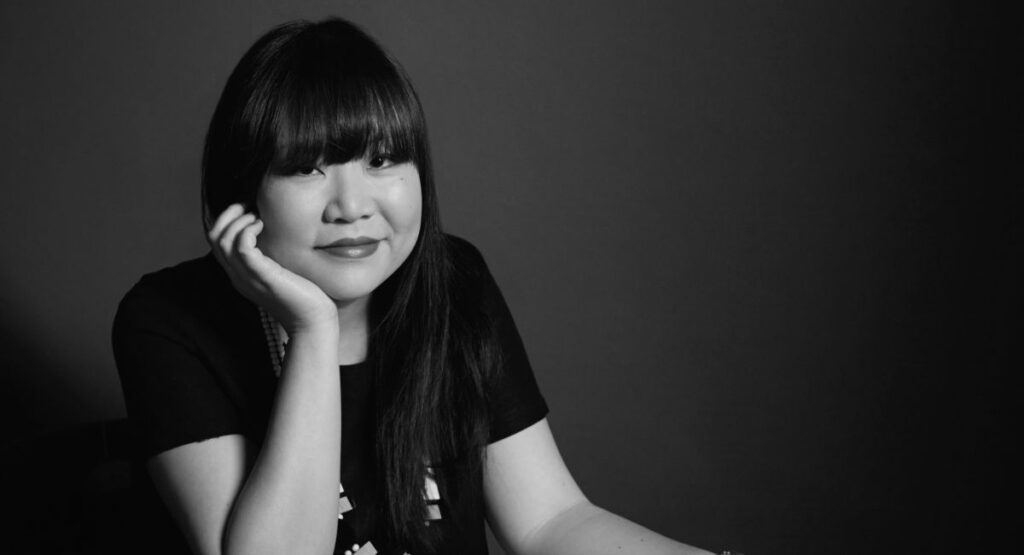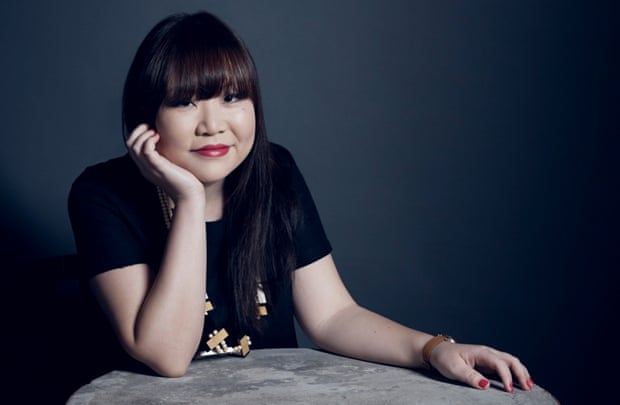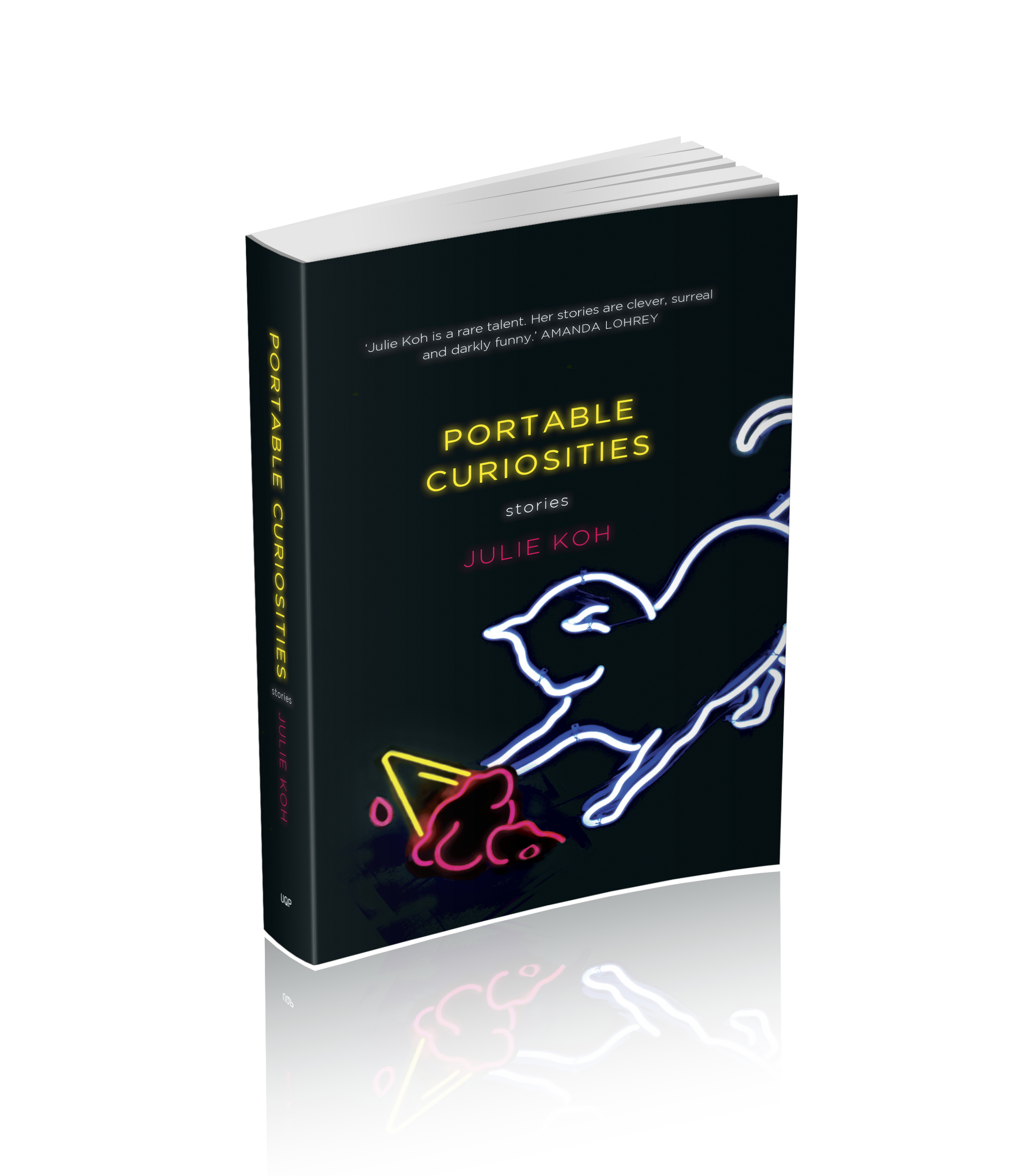Interview: Julie Koh

This is an interview with Julie Koh, author of the the new collection Portable Curiosities, in conversation with Patrick Lenton.
Julie Koh has written two short story collections: Capital Misfits (Spineless Wonders, 2015) and Portable Curiosities (UQP, 2016). Her short stories have appeared in The Best Australian Stories 2014 and 2015, The Australian, The Sleepers Almanac, The Lifted Brow, Seizure, The Canary Press, Kyoto Journal, The Fish Anthology and Fixi Novo’s HEAT. She is the editor of BooksActually’s Gold Standard 2016 (forthcoming, Math Paper Press).
She’s best known for her short stories which are at once dark, brilliant, and very funny. In her new collection Portable Curiosities, there’s not much she is afraid to take on. Hipster cafes, food culture, rampant nationalism, the refugee crisis, casual misogyny – all the complex cul-de-sacs of modern Australia are fair game for Koh.

Julie Koh (Photo by Hugh Stewart)
WB
Your book, Portable Curiosities has been labelled by a lot of reviewers as a satire – how do you feel about this? Do you classify yourself as a satirical writer?
JK
Portable Curiosities is largely satirical, although I baulk at being labelled a ‘satirist’. I never like to be categorised unless I’m in a category of my own.
I’m also uncomfortable with the label because in Australian popular culture these days, a ‘satirist’ is basically a Chaser boy. Which is not a bad thing: I just don’t want people assuming my book is in the same style and that I’ll necessarily want to comment on the daily grind of national politics.
WB
Your story Satirist Rising is actually kind of a satire of satirical writing – do you think satire is perhaps a catch-all term for literary writing that is harder to classify?
JK
Probably! I suppose my work is most easily classifiable as satire because it’s dark, funny writing that explores ideas and sometimes takes an obvious position. But it isn’t just satirical, and I hope readers see that complexity.
WB
Some of your stories have a very clear social or political message, such as the feminism in The Fantastic Breasts of the message of diversity in the The Three-Dimensional Yellow Man – how do these stories come about? Do you start with the issue and write a story around it?
JK
Both stories were always going to be satirical essays, so I did start with the issues and write the narratives around them.
With ‘The Fantastic Breasts’, I wanted to articulate for myself exactly why casual sexism is so damaging. In my early twenties, guys I knew would say horrible things about women to each other, and to me, with no sense of shame. I had a colleague who once told me about a woman who had “fantastic breasts”. I found the combination of words amusing and disturbing. He put his hands out in front of him as if touching the fantastic breasts he was describing.
I wanted to write about how the objectification of women can slide into abuse in intimate relationships. Domestic violence is not just the act of violence – it’s the most extreme point in a continuous cycle of psychological abuse. Too often, people blame the victim of physical and/or psychological abuse for staying in a bad relationship. With this story, I wanted to switch the focus and analyse the psychology of the abuser.
Similarly, with ‘The Three Dimensional Yellow Man’, I wanted to set down my thoughts on Australian racism in a comprehensive way. I was well into my late twenties before I began to understand how racial stereotypes had affected all areas of my life. I wanted to write something that said to other Asian Australians: you’re not imagining it.
PL
You have a kind of author fairy-tale origin story – a few years ago, you quit your job in law to become a writer, and have now published Portable Curiosities – has your life as a full time author met your expectations?
JK
If by “fairytale” you mean I jumped from one profession with a high rate of depression to another profession with a high rate of depression, I’ve been a wild success!
I’m not a full-time author. After law, I worked as a lollipop lady then as a tender writer for NGOs. The only reason I became a tender writer is that I was really into the work of Tom Cho and I read on his website that he wrote grants for a living. So I assumed that’s what all good fiction writers did to survive, and then I did that for the next five years. Totally clueless.
In terms of expectations, I didn’t realise how hard it would be to reach any normal financial goals, like saving for a house. The day job, although socially constructive, hasn’t been lucrative, and in the gaps between tenders I’ve written short stories, which earn next to nothing given the time they can take. As I said at the Sydney launch of Portable Curiosities, writing literary fiction is a zero dollar proposition in which you haemorrhage money and laugh while you bleed.
My accountant last year told me my fiction writing business is several thousands of dollars in the red. And I thought: ‘Why not just keep throwing money at the thing? I’m in so deep already.’ I’m very logical like that.
The pressure to produce fiction in the gaps I can find – mostly nights and weekends – has meant I’ve found myself working every minute of every day, and feeling guilty about taking time off to relax. I’ve also found life as an author particularly solitary. My job has mostly been conducted by email and phone, and fiction writing is a laptop-based affair. Picture me alone with a computer in a room, and you’ve basically summed up my lifestyle. The documentary about my life will be riveting.
WB
You are one of the most professional writers I’ve met, with a very clear work ethic and what I would classify as a strong focus. What’s your understanding of what it takes to be an author?
JK
I can only speak about my specific circumstances – what it took for me to write a book. Ultimately, it was a question of what I was willing to give up in order to have the time and freedom to teach myself to write.
My life had previously been heading in a particular direction. If I’d continued, I would probably have been a Senior Associate at a big law firm, finally married to a long-term boyfriend who didn’t want me to be a writer. I basically did an about-face and started walking in the opposite direction. People said I was crazy. These days, when people give me average reviews on Goodreads, I think: ‘I don’t care if the book is good or not. You’d give me six stars if you were there to witness the tears it took to produce this thing and put it in front of your entitled face to read.’ I have good relationships with my readers.
There’s a lot of rejection involved in writing short stories, especially if your fiction is left-of-centre. It’s a test of endurance. You basically have to be a masochist. You have to kill yourself over your work and expect no reward. Anything good that happens is a cherry on top of your diet lunch cracker. Sometimes the cherry turns out to be a mirage.

WB
What is your goal as an author – what kind of books do you want to write, what constitutes “success” for you?
JK
I’m simultaneously ambitious and unambitious. I would like to win a Booker Prize and/or not end up homeless as a result of trying to win the Booker Prize.
Of course, wanting to win a Booker is the dream of a nutcase: almost a joke goal. It’s really just shorthand for my idea of “success”: seeing how far out my mind can go. Through writing, I want to attain the highest degree of intellectual freedom that I can personally achieve. I want to produce books that help people see the world differently. That’s what my favourite books have done for me. I want to continue the tradition.
I think I’ll know it when I’ve pushed myself far enough intellectually – no prize necessary. After I get there, I’ll probably just put my hands on my hips and be, like, ‘Well, that was unfulfilling, should’ve just gone to a monastery and meditated instead.’ I mean, I’m pretty sure I know the answer to life—Buddha already found it for me—but I’m stubborn enough to pretend no one told me and then go about finding it in a really dumb, roundabout, soul-crushing way.
WB
We were talking about how being inspired by authors doesn’t necessarily mean writing like them – which authors ‘inspire’ you, and how?
JK
Many authors inspire me: one is Vikram Seth. When I was in high school, I went to see him speak. I remember him signing my book and being extremely kind. That memory still inspires me to try and behave with that level of class.
Even though I’m quite subversive, I like the idea of writing being a noble profession where you have a responsibility to keep the baton intact before passing it on to the next generation. I hope to encourage a whole new generation of noble subversives.
Click on the cover above to buy a Portable Curiosities at a special price, or click here for your chance to win one – thanks to our friends at UQP
This is a Writers Bloc Interview, part of a series of discussions with some of the most exciting writers from Australia and the world. To read more like this, click here.

